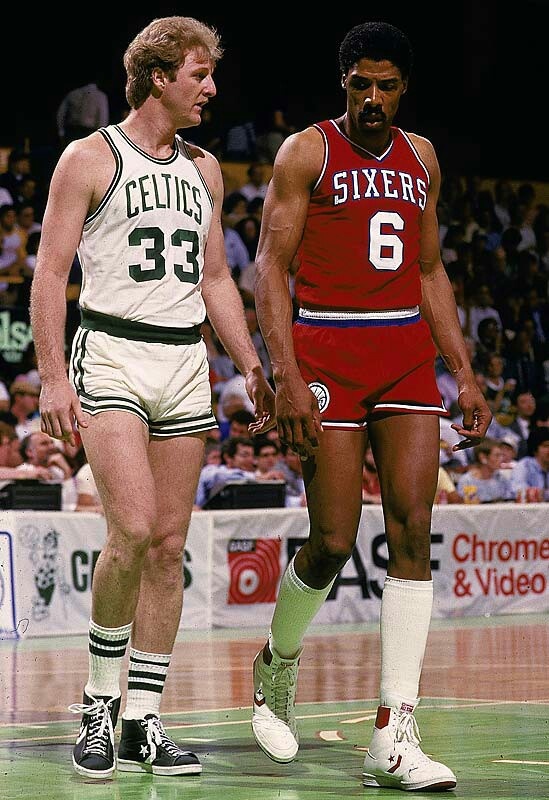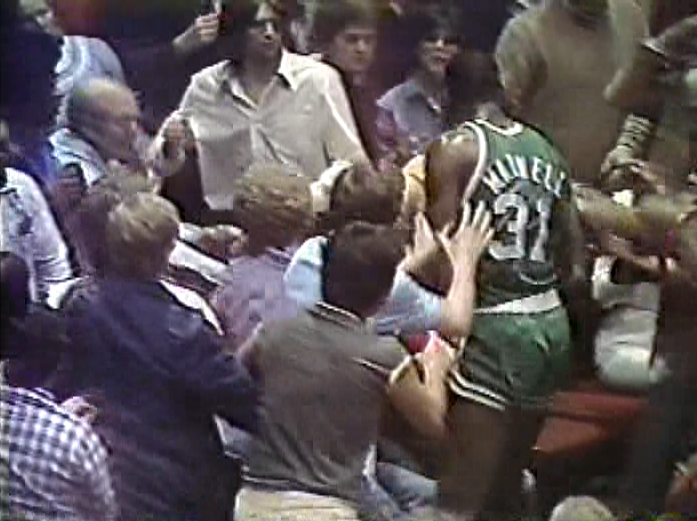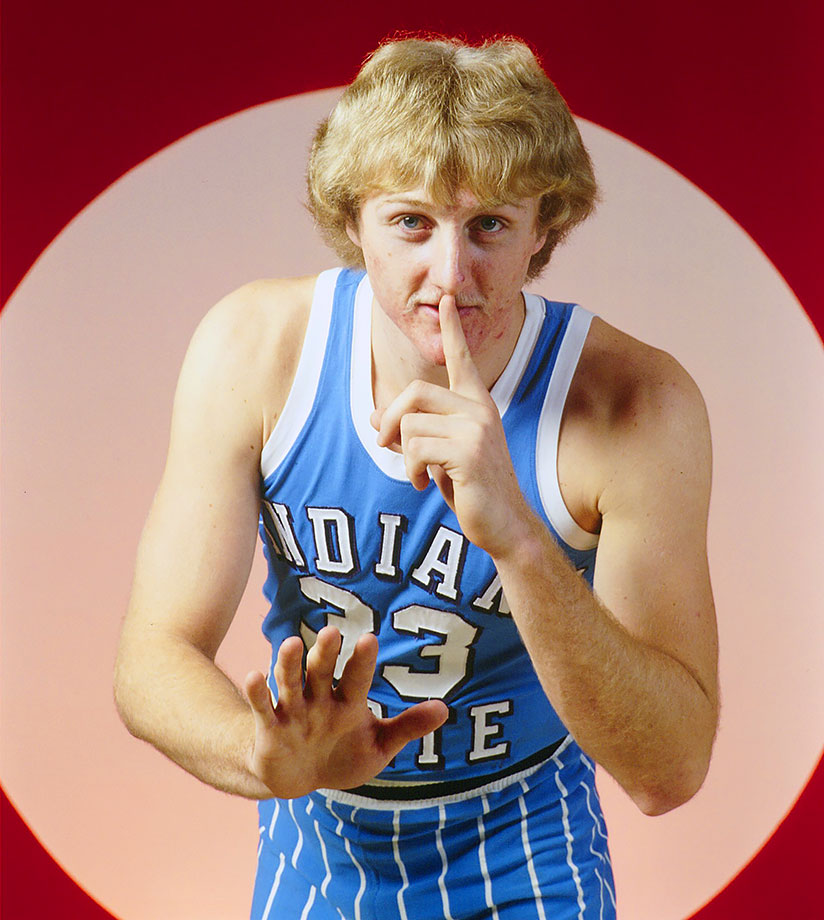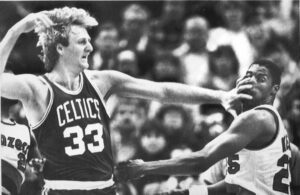
The 1981 Eastern Conference Finals between Boston and Philadelphia is arguably the most incredible post-season series in the history of the NBA.
Two great championship-caliber rivals were going at it for a ticket to the NBA Finals, where five of the games came down to the very end and then capped by a seven-game thriller.
A total of five points decided the final three games – and each contest went down to the last second.
Due in part to proximity and divisional competition, the number of times these two teams met, and their long history, the intensity level of the Boston vs. Philadelphia playoff rivalry in the 1980s was probably higher than any other – more significant even than Celtics/Lakers and Boston/Detroit.
The rival clubs squared off four times between 1980 and 1985, each time in the Eastern Conference Finals, with each team winning two series while splitting 24 games evenly, 12-12.
Each team featured three Hall of Famers in their starting lineups, with All-Stars coming off the bench, like 76er rookie Andrew Toney – and a future Hall of Famer in Celtic Kevin McHale, another first-year phenom.
The games were extraordinarily well-played and physical but not dirty. The Celtics-76ers had profound respect among the players.
Philadelphia prided itself on its basketball history and despised Boston for its more tremendous success.
In 1981, Boston and Philly finished atop the league with identical records at 62-20, and the Celtics earned home-court advantage and the top seed by beating the 76ers in a regular season finale thriller.
Boston and Philly each battled through the 1981 early rounds to a much-anticipated conference final rematch.
Boston swept a Bulls 4-0, while the Sixers outlasted the talented Bucks 4-3.
Once again, the 76ers jumped to a 3-1 series lead and looked to close out Boston 4-1 in a fifth game at the Garden.
Up to that time, only three teams had returned from a 3-1 deficit to win a playoff series (including Boston over Philly 13 years earlier).
But this time, a year older and more determined, Bird and the Celtics would not go down.
Three of the seven battles in the series were decided by two points.
The seventh and first games were decided by one point each.
Only Games Two and Three did not go down to the last play.
The NBA’s two best forwards, Larry Legend and Doctor J., squared off head-to-head in a classic showdown of the young gun trying to unseat the veteran incumbent.

First-year Celtic center Robert Parish and rookie McHale battled inside against Darryl Dawkins and Caldwell Jones.
Speedy playmakers Nate Archibald and Maurice Cheeks dueled to the finish, although Cheeks were hampered by severe sinus headaches the last three games.
Underrated Cedric Maxwell used a Game 6 fight with a fan to ignite a series-saving Celtic rally.
Veteran Celtic prominent guard defenders Chris Ford and M.L. Carr tried to slow down Sixer sniper Toney.
For the second straight time in the playoffs, Philadelphia earned its 3-1 lead by splitting the first two games, then sweeping two home at the Spectrum.
In the critical fourth game, Boston rallied from a 17-point halftime deficit but still lost 107-105. Bobby Jones stole a last-ditch long pass near the basket from Archibald intended for Bird as time expired to give Philly a commanding series lead.
Although both teams battled fiercely, it seemed like Boston wanted it a little more. They would not be denied two years in a row by the rival 76ers, especially in the Garden.
And Bird would not miss his chance to win a title and even his NBA rivalry at one title each after watching his arch-nemesis Earvin Johnson win it all as a rookie in 1980.
Having also lost to his foe in the 1979 NCAA finals, Bird was extra hungry to win his first championship at any level, which showed in his play.
However, Game 5 was shaping up to be a bad remake of the previous spring to Celtic fans.
Boston trailed 59-49 at intermission and was still behind by 10 points with six minutes left. But then they rallied to tie it.
In the final moments, Bird was knocked to the floor on his follow-through after picking up a loose ball and shooting a left-side jumper. M.L. Carr rebounded, was fouled, and hit the two winning free throws.
But then it was back to Philly and the Spectrum, where Boston had lost 11 straight games.
More drama led to a late two-point Celtic win, setting up the historic seventh game on a Sunday afternoon in Boston Garden.
For the second year in a row, Boston faced elimination at the hands of the Sixers in Game 5 of the Eastern Conference Finals at the Garden.
But, where the Celtics faltered the previous spring, this time, more excellent playoff experience and determination carried them through under pressure.
The 76ers were the favorite as they returned home, where they had beaten Boston 11 times in a row. In the first two seasons of the Bird era, Boston had never won Philly at the Spectrum.
So the task seemed daunting, especially in front of a hostile crowd.

Perhaps the most significant turning point in the contest came when Maxwell got into a shoving match under the basket with a 76er fan.
Dawkins shoved Maxwell out of bounds and banged into a Philly fan walking to his seat behind the basket.
The fan threw what looked like a cigar at Maxwell, then said something inciteful to him. Maxwell became enraged at the comment jumping into the stands and throwing a body block at the heckler.
The brawl spilled over into the seats, with players from both teams in the crowd trying to break it up.
The melee in front of the Celtic bench seemed to energize the visitors, who forgot in their collective anger that they were not supposed to win at the hostile Spectrum.
A fan threw a drink with ice onto the basket and floor after the call, stopping play for a few moments.
McHale used his long arms to wash the back of the backboard clean with a mop, defusing a bit of tension.
The game was played at a torrid intensity, but Game 7, two days later in Boston, would be pitched at an even higher rate from the opening tip to the dramatic finish.
And so the stage was set for another seventh-game showdown between the rival Celtics and 76ers on Sunday, May 3.
It turned out to be a fiercely-fought classic featuring almost unheard-of intensity.
“Whoever has the most guts and the most determination is going to win the game,” said Bird prophetically beforehand. “(The road win in Game Six) shocked them and tore them apart.”
What unfolded is one of the greatest playoff games in NBA history.
The pace was hard and fast as both teams preferred a running game, especially the 76ers, whose half-court offense was not as good as Boston’s.
The 76ers led in six of the seven games in the series at halftime, usually by a significant margin. Only in Game 2, which Boston won by 19, did the Celtics lead at the half of the series.
Bird led all players by averaging 26.7 ppg in the incredibly heated series. He canned 42 of 47 foul shots (89.4 percent) and sank 72 baskets, 17 more field goals than anyone else in the series.
The Celtics outscored the Sixers 175-171 at the foul line and canned 279 baskets to 273 by Philadelphia in the series.
The level of intensity in the series had to be seen to be believed, especially in the seventh game.
Boston averaged 104.1 ppg to 102.6 by the Sixers.

At the end of Game 7, a rarely emotional Bird put both hands behind his head, then jumped up and down near the top of the key in disbelief as hundreds of jubilant fans rushed to the court, surrounding Larry in sheer joy, releasing all the pent-up emotions from the intense rollercoaster series.
Remarkably, five of the seven games went down to the final possession. So, not surprisingly, the Celtics were emotionally spent when the 1981 NBA Finals began two days later against Cinderella Houston.
After struggling to a 2-2 start in three close games against the slowdown style of the rugged Rockets, Boston took control and won their 14th banner going away, 4-2.
But unquestionably, the actual championship series was the incredible 4-3 1981 Eastern Conference Final win over the Philadelphia 76ers.



